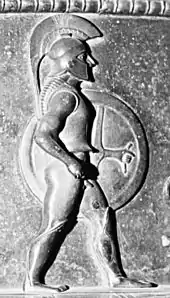Soos (king of Sparta)
Soos (Greek: Σόος) was a fictional king of Sparta, created in the 4th century BC in order to harmonise the list of the two Spartan dynasties. Various deeds were also attached to his reign, dated by ancient authors to the 11th century BC.
Life
Soos is supposed to be the son of Procles, the alleged founder of the Eurypontid dynasty, one of the two royal family in Sparta (the other being the Agiads). Modern historians however consider that he was invented during the 4th century BC. Indeed, Soos is absent from the lists of kings given by Herodotus, who wrote in the 5th century; therefore he must have been created later. He makes his first appearance in Plato's dialogue Cratylus, but he is only described there as a nobleman, not a king.[1][2] A bit later, the historian Ephorus implicitly recognised him as king, because he mentioned that Lycurgus was the sixth Eurypontid in line from Procles, which is only possible if Soos is counted as king.[3] The main reason for his addition was the need to synchronise the reigns of the Eurypontid Theopompus and the Agiad Polydorus—who were thought to have reigned together—as the Agiads counted one more king before Polydorus; so, by crafting Soos, the two king lists became symmetrical, and Theopompus' reign could be pushed later.[4]
According to Pausanias son of Procles and father of Eurypon.[5] His name means stability, a key concept for Spartan identity—such personifications of concepts are typical of orally transmitted lists.[6] During his rule Spartans took away freedom of Helots, and took to themselves some territories of Arcadia.
Plutarch wrote that once Clitorians encircled Spartans, preventing their access to water sources. Soos made an agreement that he would return lands if they would be allowed access to water. Then he promised the kingdom to the soldier who would not drink. Every one of them drank except Soos himself, so he refused to keep the agreement.[7]
References
Bibliography
- Mait Kõiv, "The Origins, Development, and Reliability of the Ancient Tradition about the Formation of the Spartan Constitution", Historia: Zeitschrift für Alte Geschichte, Bd. 54, H. 3 (2005), pp. 233–264.
